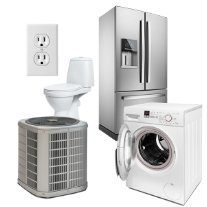Home improvements that increase your home’s value can be exceptional investments. However, it’s important to know which improvements increase home value, and which struggle to bring a good return on your investment. Before you take out a loan or spend your savings on a home project, learn which improvements actually boost property value.
Home improvements: Function vs. form
When improving your home, you don’t necessarily need to choose between function and form. That said, just because an improvement makes your house prettier doesn’t mean it’ll increase its value.
To add real value to your home, focus on projects that offer double impact. For example, don’t just target upgrades that make your home more beautiful. Instead, look for projects that make your home more functional and/or energy efficient. The following upgrades are great options for boosting your home’s resale value.
1. Kitchen is king
The heart of any home, the kitchen offers all sorts of upgrade possibilities. Even the smallest improvements and additions can add value to your property.
However, kitchen improvements can get expensive. Before you dive in, be sure to consider how you want to improve your kitchen. Most importantly, focus on your kitchen’s layout foremost when remodeling it.
2. Bathroom is incredibly important
Bathrooms offer all sorts of opportunities for upgrades. New hardware, counter tops, and upgraded showers can add to your home’s resale value.
Like the kitchen, planning is crucial when remodeling your bathroom. Smaller improvements—like replacing fixtures and repainting—are something you can do over the course of a few days. But if you’re redoing a shower or bathtub, be sure to plan.
3. Doors and windows are key
Doors and windows can add a ton of curb appeal to your house, which is very important if you ever plan to sell.
But even if you don’t have plans to sell, replacing older doors and windows can help you become more energy efficient.
And of course, if you have a garage, a new door can instantly add value to your home.
4. Basements as a living space
If you have a basement, converting it into a finished living space can add value to your home. Similarly, with the right strategy, you can even rent basement space out and generate revenue.
5. Durable siding
Cost-effective and attractive, exterior siding improves a home’s beauty and durability. This is becoming especially important as extreme weather becomes more routine.
6. Attic bedroom
Like the basement, if you have a chance to convert an attic to a living space, you can increase your home’s value.
7. Decks
In addition to enhancing the beauty of your property, a deck will also extend your home’s living space. It’s also a great way to blend indoor and outdoor spaces, which is becoming much more popular with younger generations of home buyers.
8. Steel security doors
This simple upgrade consistently offers the high investment returns for any home improvement project in the upscale or midrange category.
9. Backup power generator
Since they can restore power during an outage, even small, compact generators can bring instant value to a house. Plus, they can be a lifesaver during and after severe weather.
10. Additions
Properly planned additions almost always add value to a property. They’re also great if you have a growing family or want a means for extra cash through renting.
However, additions are one of the most expensive home improvement projects you can undertake. From permitting to building, it’s crucial to plan additions well in advance.
Be wary of swimming pools
While they may bring hours of backyard fun, swimming pools are usually bad investments when it comes to increasing home value. Typically costing between $20,000 and $50,000 to install, in-ground swimming pools bring very little return. Often called money pits, these features can cost approximately $2,000 a year to maintain and hundreds more to heat and insure. Over time, wear, tear, and cracking can bring up to $10,000 in resurfacing costs.
The National Association of Realtors’ National Center for Real Estate Research estimates that an in-ground pool can add about 8% to a property’s resale value.
That said, this can vary wildly, depending on its location in the United States. When you factor in the installation and maintenance costs, this investment doesn’t make much sense.
Aboveground pools can be even worse, despite costing much less. In fact, the Center for Real Estate Research says aboveground pool can actually result in a 2% lower asking price.
2-10 HBW offers the most comprehensive Home Warranty Service Agreements for homeowners. Let us help you protect your home.
Related content
Preparing to Add Insulation to Your Attic








